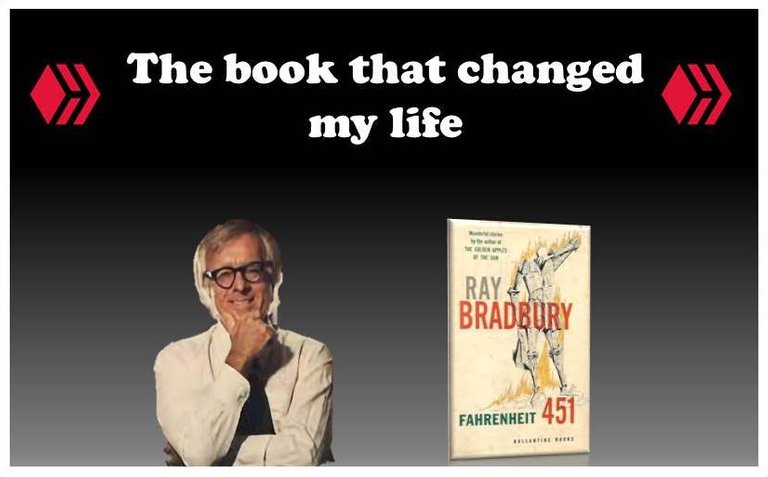
Este post es para participar en el primer concurso semanal de Hive Book Community. Las bases del concurso están aqui.
This post is to participate in Hive Book Community's first weekly contest. The contest rules are here.

Introducción
Me gusta la ciencia ficción desde niño; primero fueron series y películas, pero al crecer mi gusto por la literatura, inevitablemente acabó por ser mi genero favorito de la misma. Y fue precisamente Fahrenheit 451 (Publicado en 1953) la obra con la que me enamoré perdidamente de las historias de anticipación. Las descripciones poética de Bradbury me ensenó que la ciencia ficción puede ser un poderoso vehículo para la reflexión y la crítica.
Sinopsis
La historia presenta una sociedad en donde los libros están prohibidos, y las casas son aprueba de fuego; en este mundo extraño, los bomberos se dedican a quemar libros y ejecutar a los disidentes con fuego. Montag, un bombero como cualquier otro, por influencia de Clarisse una joven vecina, empieza a cambiar su perspectiva hacia el mundo que le rodea.
¿Como cambió mi vida? Breve reseña.
Cada personaje representa una reflexión que tomé para mí mismo y que aún hoy me acompaña.
Montag es el individuo que se ve atrapado en una vida que nunca se ha cuestionado, que nunca ha meditado, pues ¿Cómo? Si toda su vida le han enseñado a obedecer a la autoridad y despreciar lo extraño. Toma la manguera. Prende los libros. Ve a casa a ver televisión. Montag está en un vacío inexplicable, pero no lo entiende hasta que Clarisse lo ataca con preguntas. Lo hace detenerse, mirar a su alrededor, pensar en si hay más en la vida que el fuego, el entretenimiento y su neurótica esposa.
Cuando leí las escenas de Clarisse y Montag, sentí un calor en mi pecho, pues Clarisse se siente como algo frágil y bello en ese mundo de hollín y azufre. Es como el arte mismo. Que nos enfrenta a las cosas que no queremos ver de nuestra vida.
Mildred, la esposa de Montag, muestra las características que hacen este mundo aburrido y gris. Pues Mildred es una persona dopada cuya existencia se basa en su “familia”, un programa de Televisión que sigue obsesivamente sin tener en cuenta a su esposo o a sí misma. Montag siente una desesperación enorme al saber que su esposa no es más que una muñeca cuya alma ha sido robada por las pantallas gigantes que cubren las paredes de su casa.
Muy parecido a muchas personas actuales, que nunca se detienen a pensar sobre sus vidas y el significado de las mismas, siempre buscando un estímulo nuevo y más grande. Siempre rápido y sin sentido. Nunca con propósito.
Pero el verdadero antagonista del libro es Beatty, el jefe de Montag; quién representa a la autoridad. Pero no es una autoridad ignorante; Beatty ha experimentado lo peligroso de los libros para su sociedad, porque llenan a la gente de ideas sobre libertad, porque los hacen pensar y sentir que algo les falta.
Y luego, está Faber, el profesor, quién no puedo evitar pensar que es una auto-inserción del propio Bradbury, pues habla con nostalgia y tristeza de los días pasados, en donde los libros eran los medios en donde se transmitía el conocimiento y el papel no ardía, ardían los corazones de los hombres que leían las palabras en papel.
Esa sinceridad con la que habla Bradbury me llega al corazón, porque no importa que sea in bibliófilo irremediable, incluso cuando toda la obra recalca la importancia de los libros, Ray se encarga de que el lector sepa que los libros no son lo que importa al final, sino la vida misma, esa a la que apuntan los libros, que se ha perdido en el ruido de la radio, la televisión y la velocidad de los autos.
Esa fue la reflexión que me hizo abrir los ojos, porque en esa epoca pasaba por un momento de confusión, y pensaba que los libros, y tan solo los libros me salvarian. Bradbury me hizo darme cuenta de que los libros son valiosos porque nos enseñan fragmentos de la vida misma. Los libros, además de hacernos soportable la vida, nos hacen querer vivir más.
Conclusión.
Hablar sobre Fahrenheit 451 es tocar una parte de mí tan íntima, tan profunda que es difícil contenerme. Es mi libro favorito desde los 14 años y ha moldeado mi forma de pensar. Hasta hoy lo he releído cuatro veces. Nunca me canso. Siempre encuentro un detalle nuevo, algo que pasé por algo, una nueva perspectiva, algo mágico y distinto que me hace sentir que nunca llegaré a entender bien lo maravilloso de esta obra.
Como nota final, quiero señalar que dentro de poco (5 de Junio) se cumplen 9 años de la muerte de Bradbury, con lo cual, creo que lo hago aquí es un pequeño homenaje, aunque admito insuficiente, de un escritor que ha cambiado mi vida de distintas maneras.

Introduction
I have loved science fiction since I was a child; first it was series and movies, but as my taste for literature grew, it inevitably ended up being my favorite genre of literature. And it was precisely Fahrenheit 451 (published in 1953) the work with which I fell madly in love with the stories of anticipation. Bradbury's poetic descriptions taught me that science fiction can be a powerful vehicle for reflection and criticism.
Synopsis
The story presents a society where books are banned, and houses are fireproof; in this strange world, firemen are dedicated to burning books and executing dissidents with fire. Montag, a fireman like any other, through the influence of Clarisse, a young neighbor, begins to change his perspective on the world around him.
How did it change my life? Brief review.
Each character represents a meditation that I took for myself and that still accompanies me today.
Montag is the individual who is trapped in a life that he has never questioned, that he has never meditated, ¿How? All his life he has been taught to obey authority and despise the strange. He takes the hose. Turn on the books. He goes home to watch television. Montag is in an inexplicable void, but he doesn't understand until Clarisse attacks him with questions. It makes him stop, look around, think about whether there is more to life than fire, entertainment and his neurotic wife.
When I read the scenes of Clarisse and Montag, I felt a warmth in my chest, for Clarisse feels like something fragile and beautiful in that sooty, brimstone world. It is like art itself. That it confronts us with the things we don't want to see in our lives.
Mildred, Montag's wife, shows the characteristics that make this world dull and gray. For Mildred is an empty person whose existence is based on her "family," a TV show she obsessively follows without regard for her husband or herself. Montag feels an enormous despair when he learns that his wife is nothing more than a doll whose soul has been stolen by the giant screens that cover the walls of his house.
Much like many people today, who never stop to think about their lives and their meaning, always looking for a new and bigger stimulus. Always fast and meaningless. Never purposeful.
But the real antagonist of the book is Beatty, Montag's boss; who represents authority. But he is not an ignorant authority; Beatty has experienced how dangerous books are for his society, because they fill people with ideas about freedom, because they make them think and feel that something is missing.
And then, there is Faber, the professor, who I cannot help thinking is a self-insertion of Bradbury himself, for he speaks with nostalgia and sadness of days gone by, when books were the means by which knowledge was transmitted and paper did not burn, the hearts of the men who read the words on paper burned.
That sincerity with which Bradbury speaks touches my heart, because it doesn't matter that he is a hopeless bibliophile, even when the whole work stresses the importance of books, Ray makes sure that the reader knows that books are not what matters in the end, but life itself, that life to which books point, which has been lost in the noise of radio, television and the speed of cars.
That was the reflection that made me open my eyes, because at that time I was going through a moment of confusion, and I thought that books, and only books, would save me. Bradbury made me realize that books are valuable because they teach us fragments of life itself. Books, besides making life bearable, make us want to live longer.
Conclusion.
To talk about Fahrenheit 451 is to touch a part of me so intimate, so deep that it's hard to contain myself. It is my favorite book since I was 14 years old and it has shaped the way I think. To this day I have reread it four times. I never get tired of it. I always find a new detail, something I went through, a new perspective, something magical and different that makes me feel I will never quite understand the wonder of this work.
As a final note, I want to point out that soon (June 5) will be 9 years since Bradbury's death, so I think that what I do here is a small tribute, although I admit insufficient, to a writer who has changed my life in different ways.

Congratulations @gab0nt! You have completed the following achievement on the Hive blockchain and have been rewarded with new badge(s) :
Your next target is to reach 50 upvotes.
You can view your badges on your board and compare yourself to others in the Ranking
If you no longer want to receive notifications, reply to this comment with the word
STOP